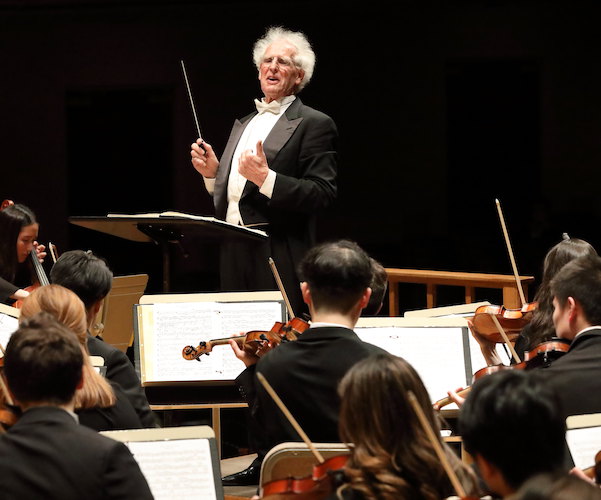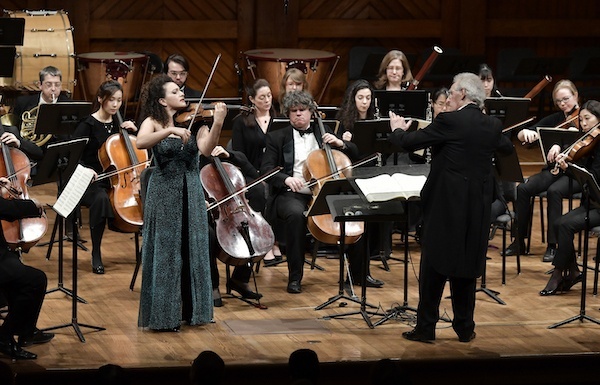Classical Music Preview: Boston Philharmonic Orchestra’s 2022-23 Season
By Jonathan Blumhofer
The season-long celebration of the fiftieth anniversary of Benjamin Zander’s debut as a conductor, which gets underway later this month when the Boston Philharmonic Orchestra (BPO) returns to the stage, doesn’t stint on festive spirit.

Benjamin Zander conducting the at Symphony Hall. Photo: Hilary Scott.
True, the optics might not rival Queen Elizabeth II’s 2002 golden jubilee (with its parades and a culminating fly-by of the Concorde down the Thames). But the season-long celebration of the fiftieth anniversary of Benjamin Zander’s November 1972 debut as a conductor, which gets underway later this month when the Boston Philharmonic Orchestra (BPO) returns to the stage, doesn’t stint on festive spirit.
Indeed, the commemoration takes multiple forms. There are, of course the BPO’s four programs, as well as those of the Boston Philharmonic Youth Orchestra (BPYO). Additionally, Zander’s acclaimed interpretation classes, not held in public for two years because of the pandemic, are back, starting at the Boston Public Library on October 22nd.
Then there’s the unveiling of a revamped Benjamin Zander Center website. This last is a years-long effort in the making – “a lot of work,” as its namesake understatedly put it to me when we met at his Cambridge home a few days ago to discuss the upcoming year. Understandably, it’s somewhat incomplete: the archives aren’t yet comprehensive and future concerts and interpretations classes remain to be added. But, as a serious effort to collect all the threads of Zander’s multitudinous professional activities under a single electronic roof, it succeeds handsomely.
The principal idea behind the reworking was to make the contents of Zander’s work accessible to the lay-listener as much as to the professional. To that end, one has the option of clicking a link and taking a Zander-curated tour through its myriad pages, touching on favorite repertoire, performances, analyses, and coaching sessions. Or one can simply peruse its materials freely (“like walking through a gallery,” Zander offered with a laugh). (The website’s five main sections relate to, respectively, the BPO, BPYO, Interpretation Classes, “Thriving during COVID,” and The Art of Possibility).
By and large, the forum provides a thorough summation of Zander’s musical and educational work and often viscerally conveys his singular blend of energy, excitement, and love for the music with which he’s working (that comes out particularly well in the videos of the interpretation classes). The pages also deliver a welcome look behind the curtain at Zander’s family background (including touching tributes to his father, Walter) as well as his non-musical projects (like public speaking and Possibility).
But the bulk of its contents deal freely and generously with the recorded legacy of both the Philharmonic and the Youth Orchestra. In true Zander fashion, there’s no shortage of supplementary materials to go along with these parts: the conductor’s enlightening Listening Guides and pre-concert talks are available in full, as are program notes, contemporaneous reviews, and complete concert recordings.
The result is a trove of well-documented, invigorating music making, its finest moments – like the Philharmonic’s blistering Bruckner Eighth Symphony from last October and their powerhouse Elgar First from 2016 – truly exceptional. The Youth Orchestra is well represented, too: just try not to be astonished by their Ruslan and Ludmilla Overture from 2015, or the mighty Shostakovich Fifth Symphony taped during this past summer’s tour to Greece.
Taken together, it’s a terrific resource, both for casual and curious listeners or students, as well as for trained musicians. It’s also a testament to the breadth and warm-heartedness of Zander’s lifetime of work in and around Boston – as well as the sheer power of some of the music he conducts and coaches.
And, indeed, the music is what matters most to Zander as he reaches a milestone only a few conductors manage to achieve.
“We’re actually looking backwards and forwards this season,” he told me when we met. “Backwards with the repertoire and forwards with the soloists, who are musicians that will carry the artform well into the future.”
To be certain, both orchestras’ upcoming programs are firmly canonic: the most recent piece the Philharmonic is playing is Mahler’s Das Lied von der Erde (premiered in 1912) while, for the Youth Orchestra, it’s Bartók’s Concerto for Orchestra, which was first heard in 1944. (Like last season, all BPO and BPYO concerts are being presented at Symphony Hall.)
Even so, Zander is anything but complacent in his thinking about this music. That’s certainly been true over the years of his way with Beethoven. This season’s performance of that composer’s Ninth Symphony, which the Philharmonic plays at Symphony Hall on February 24th and takes to Carnegie Hall two nights later, promises to be a case-in-point. “The last time we played it [in 2013],” he noted, “I was primarily concerned with strictly observing the metronome markings. This time, I’ve been thinking much more about ensuring that the line has room to breathe flexibly” while still adhering as much as possible to Beethoven’s generally brisk tempo indications.
And, though Zander is a Mahler specialist, Das Lied is hardly a regular presence on local concert programs: the last time it turned up at Symphony Hall was in 2013. The Philharmonic’s April 14th concert brings together a pair of exceptional Mahler singers – mezzo-soprano Sarah Connolly and tenor Stefan Vinke – and pairs this visionary score with Franz Schubert’s Unfinished Symphony.
Before that come two purely instrumental concerts. The season-opener, on October 19th, combines Sergei Rachmaninoff’s Symphony No. 2 with Beethoven’s Piano Concerto No. 4. Zander is as profoundly taken with the former – when I arrived at his house, he began our chat by extolling the music’s structural and melodic brilliance – as he is enthusiastic about the concerto’s soloist, Jonathan Biss, describing him as “a true artist…like Rudolf Serkin.”

Violinist Liza Ferschtman performing with the Boston Philharmonic Orchestra (BPO). Photo: Paul Marotta.
Zander’s similarly excited about Hayoung Choi, who takes the spotlight in Dvorak’s Cello Concerto for the Philharmonic’s second program on November 12th. That work is an old favorite of the the conductor’s, and, on this evening, it will be heard alongside the very first piece he ever led, Brahms’s Symphony No. 2.
With the Youth Orchestra, the schedule is similarly packed. Though, technically, the group’s eleventh season, this year is, thanks to the pandemic, just the tenth in which they’re performing together. So, it’s fitting that their programs revisit some of the orchestra’s first-decade high points.
The ensemble’s opening concert, on November 20th, combines Richard Strauss’s high-octane Ein Heldenleben with Beethoven’s Fifth Symphony. On March 10th comes the Bartók and Tchaikovsky’s Symphony No. 5. And, to cap off the year locally on May 3rd (a South African tour is projected to follow in June), is one of the biggest pieces any orchestra’s presenting in Boston this season: Mahler’s Symphony No. 2.
This is atypically ambitious fare for an orchestra made up, mainly, of teenagers. Then again, the BPYO isn’t your regular youth orchestra. And that’s fundamentally thanks to Zander who, though eighty-three, remains as physically energetic and mentally (and musically) sharp as ever. Those aspects came over strongly in our conversation in Cambridge. Though he periodically acknowledged the passage of time, Zander’s focus was firmly on the coming season, and his excitement at the opportunity to share new insights into this familiar repertoire was palpable. Ditto for the website.
All of it, or course, serves a single purpose, to wit: advancing Zander’s contention that “everyone loves classical music. Some people just don’t know it yet.” It also makes, if not a literal golden anniversary present, then its musical and educational equivalent.
Jonathan Blumhofer is a composer and violist who has been active in the greater Boston area since 2004. His music has received numerous awards and been performed by various ensembles, including the American Composers Orchestra, Kiev Philharmonic, Camerata Chicago, Xanthos Ensemble, and Juventas New Music Group. Since receiving his doctorate from Boston University in 2010, Jon has taught at Clark University, Worcester Polytechnic Institute, and online for the University of Phoenix, in addition to writing music criticism for the Worcester Telegram & Gazette.
Tagged: Benjamin-Zander, Boston Philharmonic Orchestra

Jonathan;
So nice to read this comprehension summary of the season and legacy!! I hope all is well with you.
Peter
Woo hoo! Thanks for the shout out about the masterclasses/videos/talks.. so much amazing stuff!! Cheers, John